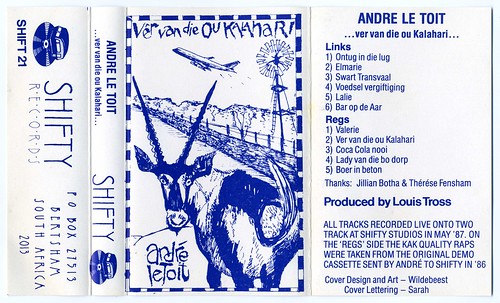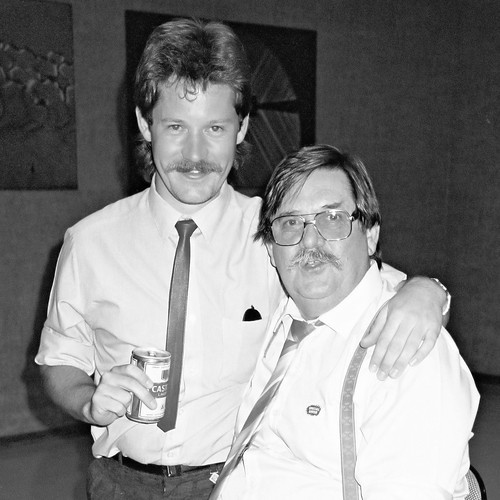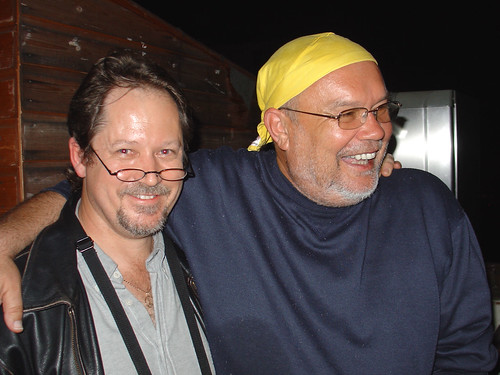
The were leaving their family and friends in Landskreis Regenwalde in Hinterpommern and making the perilous journey to a new life in British Kaffraria on the south eastern coast of Africa. Fittingly the song "Hometalk" by South African group Mango Groove is playing in the background. There's certainly a lot to think about tonight.
Just over 20 years ago I was part of a drunken crowd of a few hundred people who witnessed one of Koos Kombuis' first significant public performances at a run down basement dive called The Pool Club in Hillbrow, Johannesburg. The was the ground-breaking "Eerste Alternatiewe Afrikaanse Rock Konsert" featuring Koos Kombuis (then known as Andre le Toit), die Gereformeerde Blues Band, Bernoldus Niemand, Mr Mac and the Genuines and a punk band called Koos. The South African music scene changed fundamentally that night, and the ripples created ultimately merged into the tsnumi that washed away the grime and rot of Apartheid. And this insignificant child of Pomerania and his future wife, were a part of that fledgling movement.
Seventeen children and six adults died aboard the La Rochelle on its three month journey south, and in the midst of all this, Sophia gave birth to Auguste Mathilde Wilhelmine who now lies in Kaffraria's bosom in Macleantown. Times were incredibly hard for the settlers to what is now the Eastern Cape of South Africa. Tribal tensions with the Gaika were high, there was limited infrastructure and my family were among the group of pioneers that founded the settlement of Braunschweig north of King William's Town. These peasant farmers carved an existence from the bush, rock and poor soil that characterises the "Border" area. It was life, but not as they'd known it on the Ostsee where the earth was bountiful, but where they lived in servitude. Actually, it wasn't life at all, but survival...and I'm sure that, on reflection, Karl must have quietly wished that he'd taken the ship west to America instead of south the Africa.

20h36 and we're still waiting for Koos. Between 1988 and 1989 we did that a lot. He was never really punctual for his concert appearances, and this was exacerbated by his penchant for Tassies and boom! And we loved him for that. He could only play three or four chords, and we related to that. He was uncomfortable in public and on stage, and we warmed to that. And, my god, he said things that cut to the very core of us. Koos raised issues and expressed himself in ways that many of us living under a state of emergency in Apartheid South Africa would never have dared. This eloquent but troubled young Afrikaner bohemian (who peppered his speech with ripe obscenities) became the standard bearer for an oppressed and voiceless generation of white kids. And we travelled the country to bask in his light. Together we trail blazed a vision of the future.

Braunschweig was the frontier of Kaffraria, and became the centre of the Pautz universe in Africa. Here they built their homes, church and school, this is where they raised their families and this is where they died an are buried. These immigrants from the other side of the world assimilated, over time, and became one with Africa. Their names changed from German to English at the turn of the century and within less than 60 years or their arrival, they were dying for the Crown close to Ypres in the slaughterhouse of First World War Flanders. Not too far away, north-east of Arras at Vimy Ridge, a young man with the same surname gave up his life for the Kaiser. Family against family. What a fucked up world it was.
Koos and I also grew up in screwed up place back in the 60's, 70's and 80's. After over 120 years in the family, Pautz property in Braunschweig was expropriated by PW Botha's regime and incorporated into the so-called "homeland" of the Ciskei. The German community in the Eastern Cape was essentially erased from history. Around the same time, Andre le Toit was a struggling poet who was about to reinvent himself. James Philips (a.k.a. Bernoldus Niemand) broke the cultural ice by releasing the first Afrikaans rock anti-establishment album (called "Hou My Vas Korporaal") and this resonated with Andre, who produced a demo cassette that became the album "Ver Van Die Ou Kalahari". Because it was critical of the regime, this vital music received no airplay or exposure, and was only available, to those in the know, by mail order. I was one of the secretive recipients of the little brown package from Shifty Records. I still have my original Andre le Toit cassette, and treat it like the sacred relic it truly is. And it was this music that brought us together at the Pool Club in Hillbrow back in 1988.

21h30 - the audience is small, but Koos Kombuis takes the stage. This was the set list for the night:
1. Onder in my Whiskeyglas
2. Johnny is nie Dood Nie
3. Kytie
4. Liza se Klavier
5. Die Fokol Song
6. Hoe Lank Moet Ons Nog Sorry Sê?
7. Huisie by die See
8. Robert McBride
9. Cry to Me (Afrikaans Version)
10. Die Trein na Tshwane
11. Lente in die Boland
12. Fat Cat Piete (ANC Tiete)
13. Paranoia In Parrow-noord
14. Bicycle Sonder 'n Slot
15. Sestien Jaar Met 'n Vals Kitaar
16. Sommige ou Tannies Blues
17. Anderkant die Longdrop
18. Liefde uit die Oude Doos
23h00 and the end of a fairly subdued performance by the Big Man. I spoke with Koos before the show and had planned to see him after the performance. But it was going to be a two hour commute back home, and so I packed it in and left for north London. The journey back was slow and frustrating.
May 31, 2008. The next day and 150 years since Captain Johannes Meyer piloted the three-masted La Rochelle out of Hamburg harbour. On board were 91 families, bringing the total number of passengers on board to 463. Brave people indeed - I am in awe of their bravery and fortitude. So why did I make the long journey to the Aardvark and back last night to see Koos Kombuis? It's all about saluting pioneers - looking back and acknowledging our roots while looking forward and working on my new history and fresh memories.
The pioneer Karl August Ferdinand Gottlieb Pautz died in Braunschweig in 1898 but he lives on in my three year old son who bears his name. His descendants have survived and prospered in South Africa and over the past decade or so a few of them have been infused with his spirit and made major international moves abroad. I was one of the first, relocating to Bohemia in the Czech Republic back in 1995, which afforded me the opportunity to spend a significant amount of time in the family villages in Landskreis Regenwalde. It was wonderful to close that family loop.
The modern pioneer, Koos Kombuis, is thankfully alive and kicking and, over the past two decades we've got to know each other from a distance. From being the "least likely to succeed" among the so-called "Alternatiewe Afrikaners" of the 1980's the man had forged for himself a niche in South African art, culture and history. He continues to be a social conscience, tongue lashing the incompetence of the government of the day in South Africa, while continuing to make a lot of middle aged balding men like myself happy. We understand the context, history and significance of what he has achieved, and the role that he played in the transformation process in South Africa.
The kids who were at the Aardvark last night were mostly clueless...they had absolutely no sensitivity for the satire and sneering. All they were there for was the profanity, sexual innuendo and beer. And that was the sad enlightenment of the evening - South Africans have incredibly short memories, very little sense of history and nave no appreciation for the pioneers who put themselves out on a limb in the distant past, and who carved out the present.
But I remember. I thank Karl Pautz and Koos Kombuis for their balls, guts, passion, tenacity and survival instinct...and for injecting a good measure of that pioneering spirit into me and my family!

Holy shit – I’ve just realized something else. May 31, 1990 was the last time I ever spoke to my late father. He called me in London that evening (creepily at about the same time I started writing this piece) and died unexpectedly of a heart attack on the morning of June 1. That precipitated my relocation back to South Africa where I spent the next five years before heeding the call of my ancestors and moving to Central Europe and back to the lands that Karl August Ferdinand Gotthilf Pautz left behind him a century and a half ago.
May 30 and 31 are certainly significant dates in the story of my life.

MAlfaRK ©
